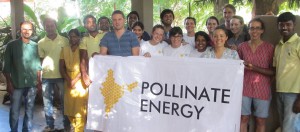Pollinate Energy is a group of young Australians who flourish on creating sustainable solutions to social problems.
The mission of the team is to improve the lives of India’s poor by giving them access to sustainable products for a better living condition.
At the moment, they target on energy access and have plans to expand into many other facilities for poor people living in urban India.
Pollinate Energy is committed to supporting the next generation of social entrepreneurs and to promote for energy and water poverty in developing countries.
They offer three diverse programs to develop an individual’s entrepreneurial skills and knowledge as well as provide a wider perspective on these critical global issues.
Their business aims to enable access to sustainable technologies. They do social good by targeting groups of people that otherwise have no access to these technologies, by making the technology affordable, and by remaining fully accountable to the customer and ensuring that the products are fulfilling their purpose.
In addition, Pollinate Energy trains local people to sell solar lights in slums, named as pollinators, creating new distribution channels and overcoming the challenge of getting renewable energy into the slums.
These Pollinators are equipped with the best solar systems on the market and sell them to families within their communities.
Each pollinator is provided with a Business in a Bag, an essential a tool kit providing them with transport allowance, to smart phones with a Salesforce cloud management system.
This gives communities access to cheaper renewable energy, providing alternatives to kerosene lamps and it gives community members the opportunity to earn extra income through a micro-entrepreneurship program.
In India, Pollinate Energy trains members of the local community in Bangalore, to distribute and install solar lighting systems as micro-entrepreneurs.
So far, over 10,000 poor living in Bangalore’s slums have been provided with solar systems, saving more than 40,000 liters of kerosene and 100,000 kilograms of carbon emissions to date.
editor@greentechlead.com


